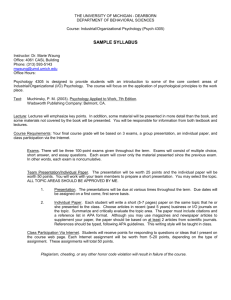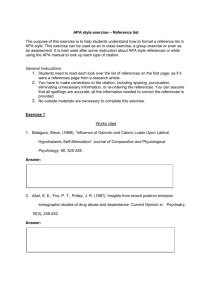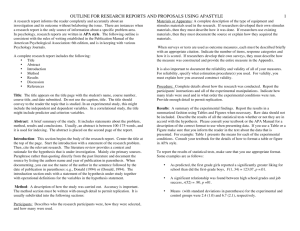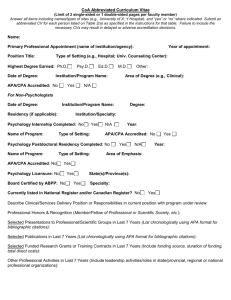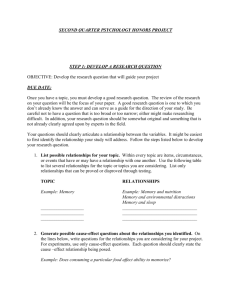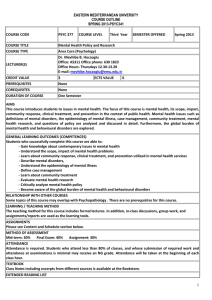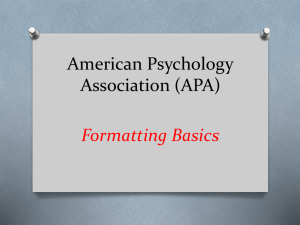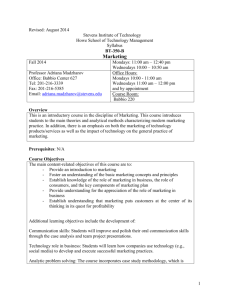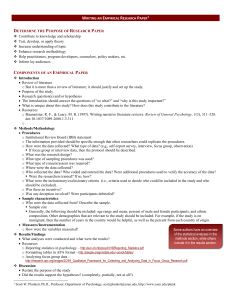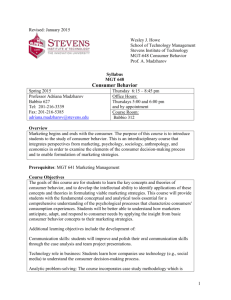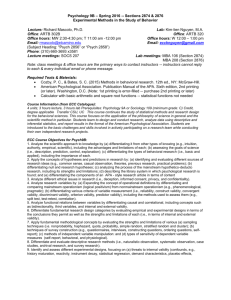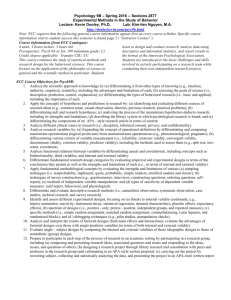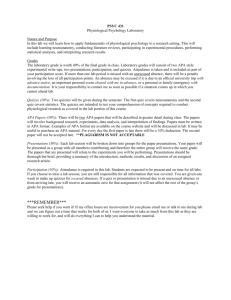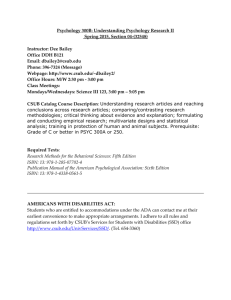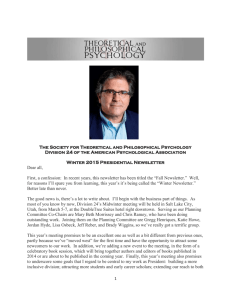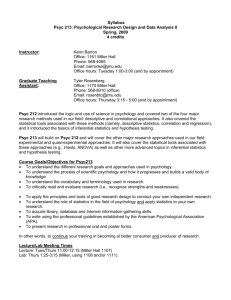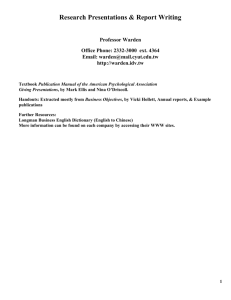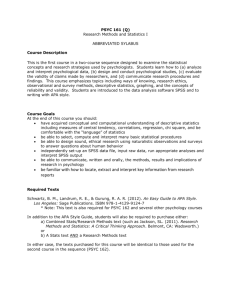Psychology 450 W Professor: Jill M. Norvilitis
advertisement
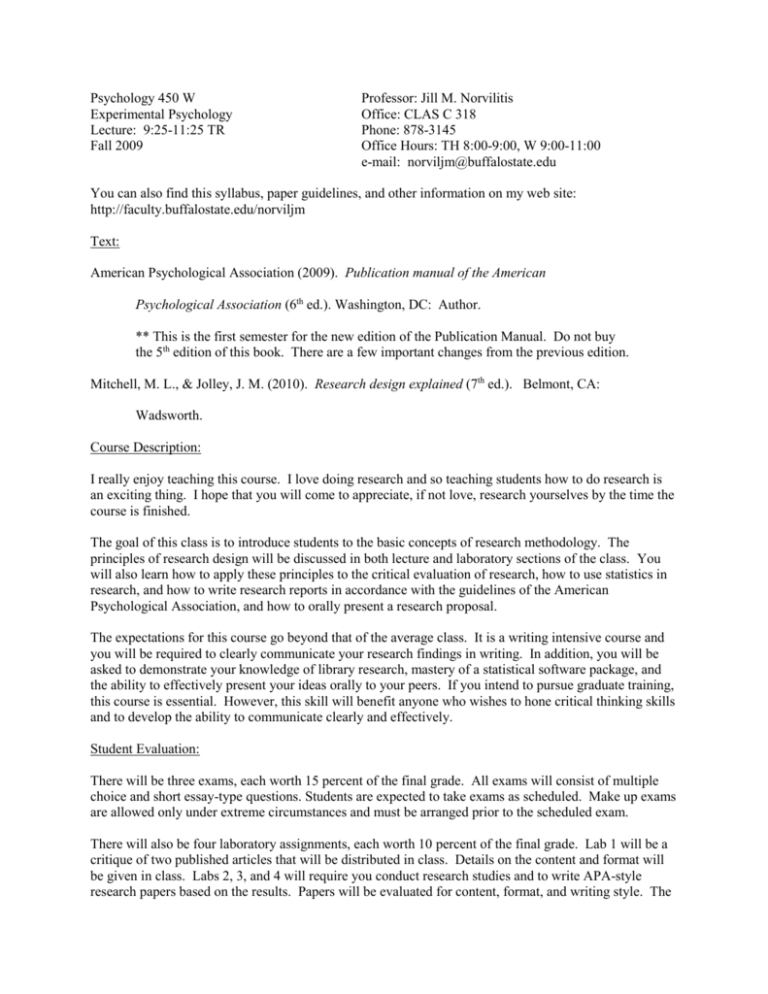
Psychology 450 W Experimental Psychology Lecture: 9:25-11:25 TR Fall 2009 Professor: Jill M. Norvilitis Office: CLAS C 318 Phone: 878-3145 Office Hours: TH 8:00-9:00, W 9:00-11:00 e-mail: norviljm@buffalostate.edu You can also find this syllabus, paper guidelines, and other information on my web site: http://faculty.buffalostate.edu/norviljm Text: American Psychological Association (2009). Publication manual of the American Psychological Association (6th ed.). Washington, DC: Author. ** This is the first semester for the new edition of the Publication Manual. Do not buy the 5th edition of this book. There are a few important changes from the previous edition. Mitchell, M. L., & Jolley, J. M. (2010). Research design explained (7th ed.). Belmont, CA: Wadsworth. Course Description: I really enjoy teaching this course. I love doing research and so teaching students how to do research is an exciting thing. I hope that you will come to appreciate, if not love, research yourselves by the time the course is finished. The goal of this class is to introduce students to the basic concepts of research methodology. The principles of research design will be discussed in both lecture and laboratory sections of the class. You will also learn how to apply these principles to the critical evaluation of research, how to use statistics in research, and how to write research reports in accordance with the guidelines of the American Psychological Association, and how to orally present a research proposal. The expectations for this course go beyond that of the average class. It is a writing intensive course and you will be required to clearly communicate your research findings in writing. In addition, you will be asked to demonstrate your knowledge of library research, mastery of a statistical software package, and the ability to effectively present your ideas orally to your peers. If you intend to pursue graduate training, this course is essential. However, this skill will benefit anyone who wishes to hone critical thinking skills and to develop the ability to communicate clearly and effectively. Student Evaluation: There will be three exams, each worth 15 percent of the final grade. All exams will consist of multiple choice and short essay-type questions. Students are expected to take exams as scheduled. Make up exams are allowed only under extreme circumstances and must be arranged prior to the scheduled exam. There will also be four laboratory assignments, each worth 10 percent of the final grade. Lab 1 will be a critique of two published articles that will be distributed in class. Details on the content and format will be given in class. Labs 2, 3, and 4 will require you conduct research studies and to write APA-style research papers based on the results. Papers will be evaluated for content, format, and writing style. The details of APA style will be covered in class and you will be expected to refer to the APA Manual for additional format requirements. Please note. When turning in Laboratory 3, Laboratory 2 must be attached. When turning in Laboratory 4, Laboratories 2 and 3 must be attached. Repetition of the same basic APA style errors from one lab to another will result in heavy penalties. Please pay attention to my comments on your papers. They are intended to help you learn. Students will be required to design an experiment for the last 15 percent of the final grade. As part of this, you must formulate a research question, design a study to test it, and write a paper according to APA format. Your project must be one that you could complete in an independent study or an honors thesis, though you are, of course, not required to complete PSY 499 or 496. This proposal should include a title page, a brief review of related literature, your hypothesis, a description of your methodology to include subjects, materials, and procedures, your proposed statistical analyses, a consent form, and your references. Your proposed materials, including any questionnaires or other stimuli must be attached or thoroughly described. You will also be required to present your research proposal to the class near the end of the semester. Your paper is due November 19. Topics are due on September 10. Late topics will result in a 10 percent deduction off of the final paper grade. All papers are due at the start of the class on their due date. Late papers will be penalized 20 percent the first day they are late, 40 percent the second, and will not be accepted after that. All papers must be typed and double-spaced. Misspellings will not be tolerated and may result in your paper being returned ungraded. All class work must be completed in order to pass the class. All students are required to complete the CITI training that will be introduced at the Human Subjects Workshop. Failure to turn in the completion certificate will result in a failing grade for the course. Attendance is essential if you are to meet the objectives of this course and will be monitored. It is not a formal part of your grade, however, it will be taken into account for borderline grades (that is, if a 79.4% is a C+ or B-). The exception to this is that attendance is required for each laboratory, for the human subjects workshop, and for the presentations at the end of the semester. Failure to attend any one of these will result in a 10 percent deduction on the grade of the corresponding paper. Academic Integrity: Academic integrity is based on the principles of honesty and individual responsibility for actions. Violations of academic integrity include cheating on exams, plagiarism, falsifying data, or engaging in behavior that inhibits someone else’s academic performance. This type of behavior will not be tolerated and may result in failure of the course. If you are unclear about the policy regarding academic integrity at BSC, you are encouraged to read the college’s official policy. Tentative Course Schedule Date Chapter Topic 9/1 1 Course Introduction; Science, Psychology and You 9/3 2 Validity and Ethics 9/8 3 Generating and Refining Research Hypotheses 9/10 4 Laboratory One—Article Critiques; Paper Topics Due 9/15 15 Reporting Research Using APA Format 9/17 Exam 1 9/22 The Ethics of Research 9/24 Human Subjects Workshop; Meet in C 104; Lab One Due 9/29 Laboratory Two—Attractiveness 10/1 PsycInfo Demonstration; Meet in C 104; CITI Training Certificate Due 10/6 5 Measuring and Manipulating Variables 10/8 Introduction to SPSS; Meet in C 104 10/13 Laboratory Two data analysis; Meet in C 104 10/15 6 10/20 Beyond Reliability and Validity: The Best Measure for your Study Laboratory Three—Conservation; Lab Two Due 10/22 7 Introduction to Descriptive Methods and Correlational Research 10/27 8 Survey Research; Laboratory Three data analysis; Meet in C 104 at 10:00 10/29 continued 11/3 Exam 2 11/5 Laboratory Four—Gender and Memory; Lab Three Due 11/10 9 Internal Validity 11/12 10 The Simple Experiment 11/17 11 Expanding the Simple Experiment; Laboratory Four data analysis; Meet in C 104 at 10:00 11/19 12 Expanding the Simple Experiment; Research Proposals Due 11/24 13 Matched Pairs, Within-Subjects, and Mixed Designs ; Lab Four Due 12/1 14 Single-n Designs and Quasi Experiments; Introduction to PowerPoint 12/3 Proposal Presentations 12/8 Proposal Presentations 12/10 Proposal Presentations Final Exam: Tuesday, December 15 at 7:40 in this classroom.
